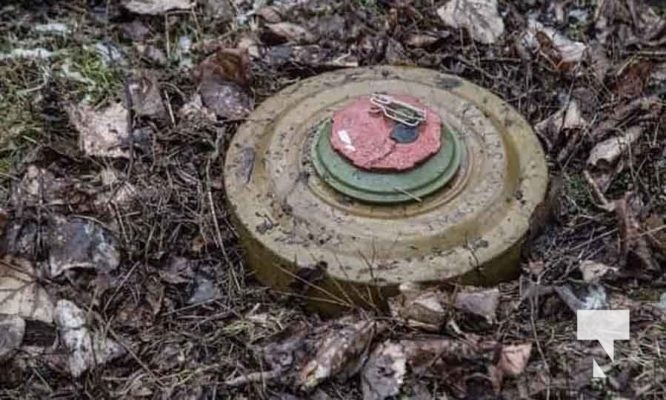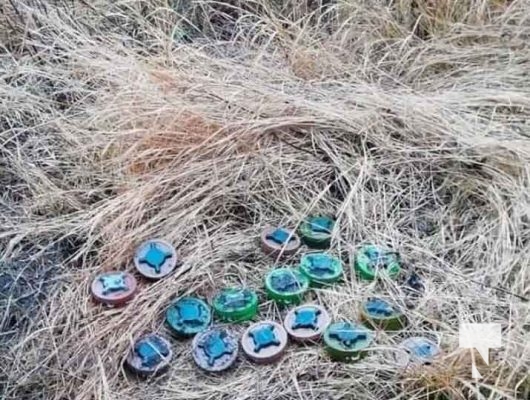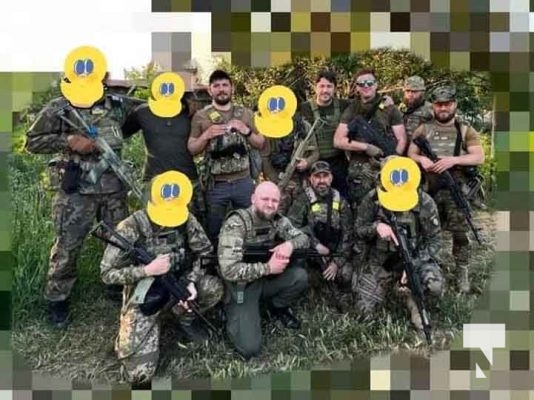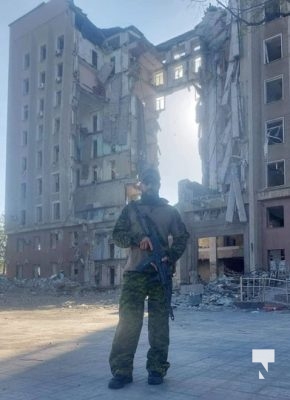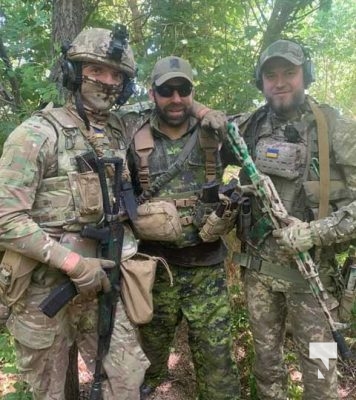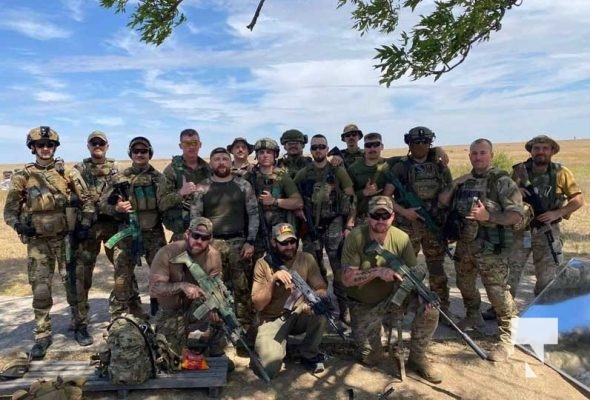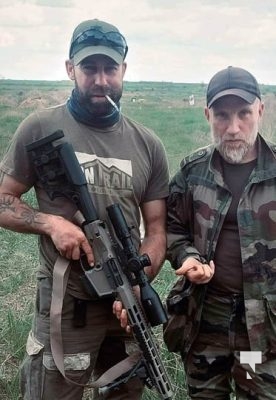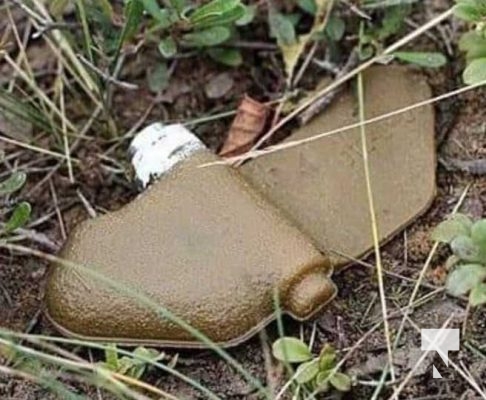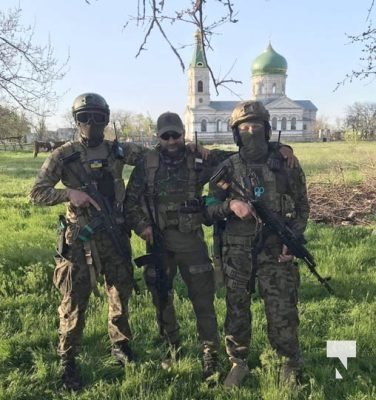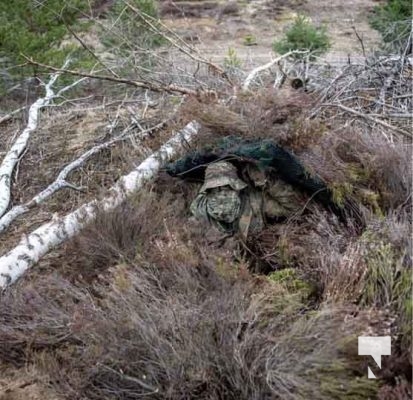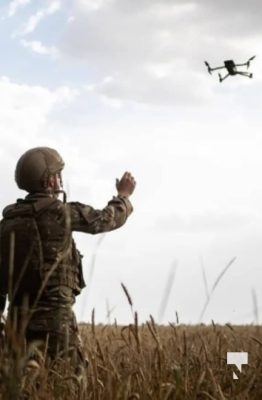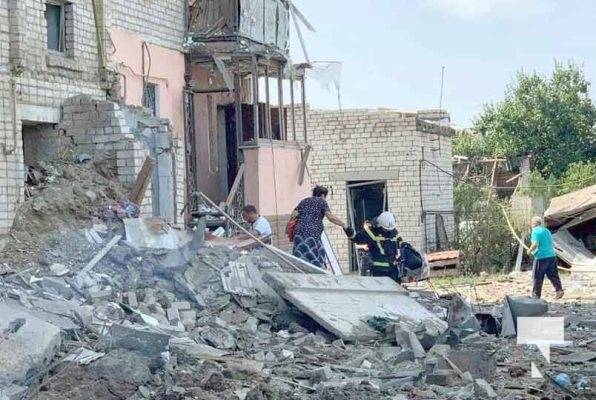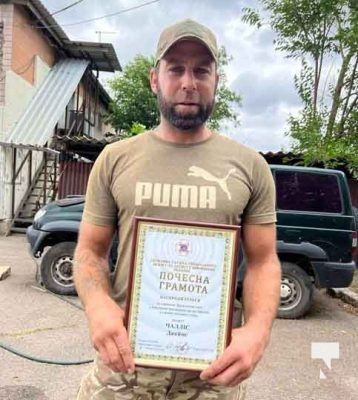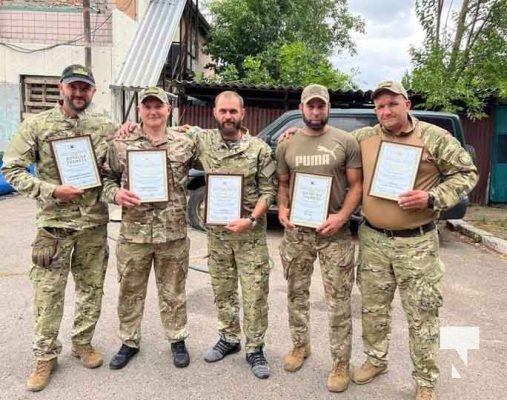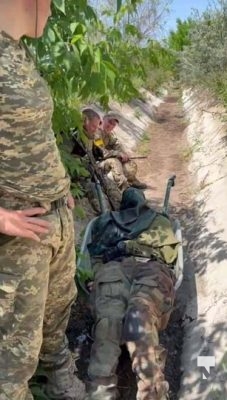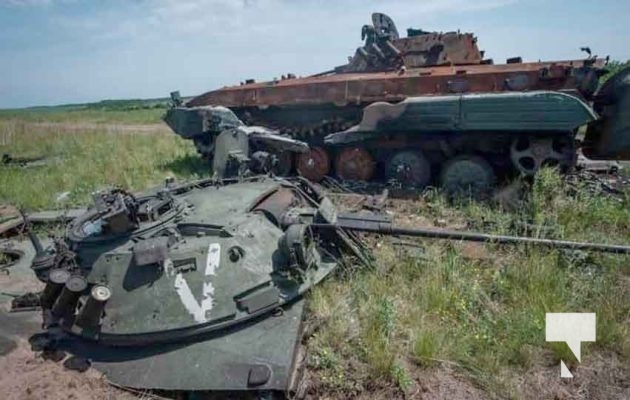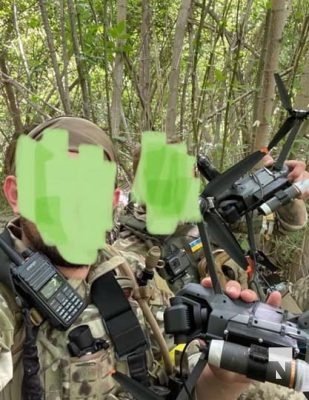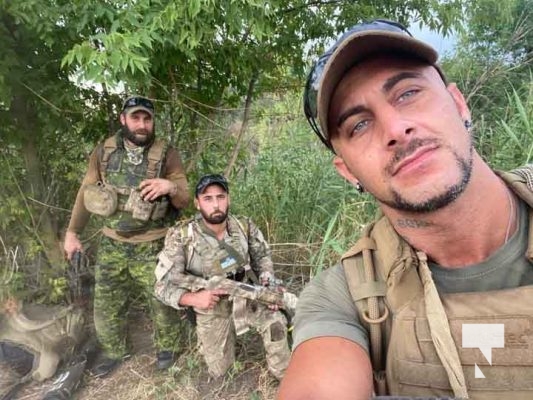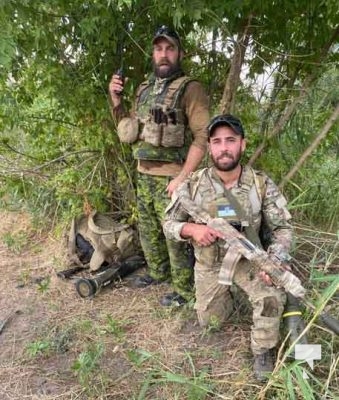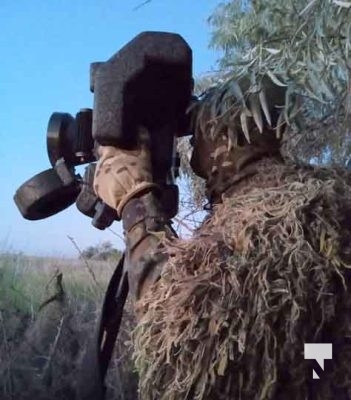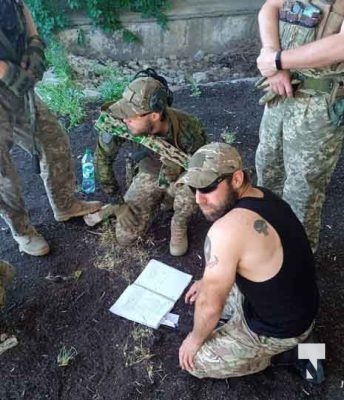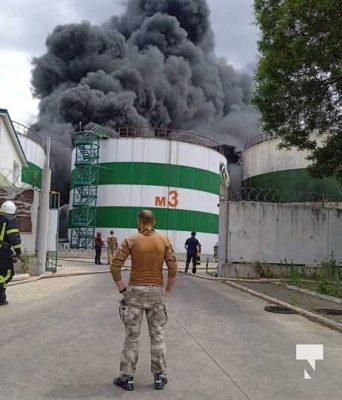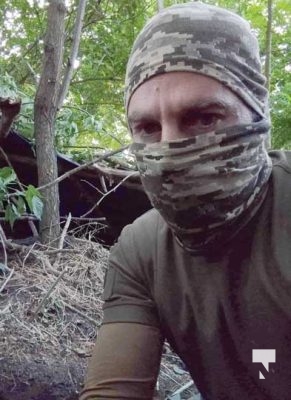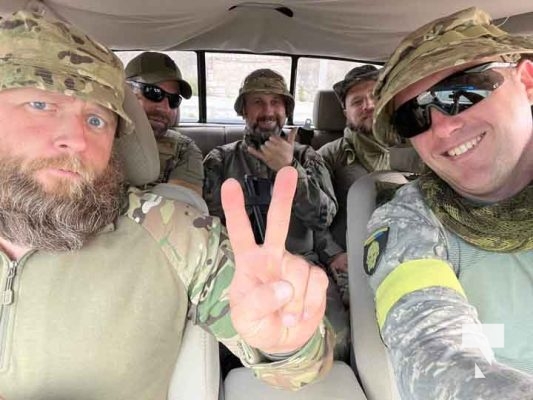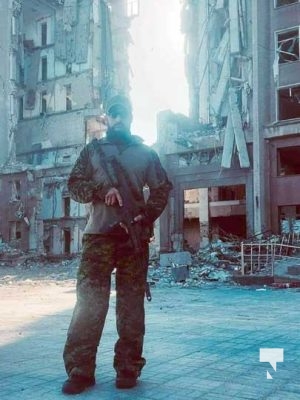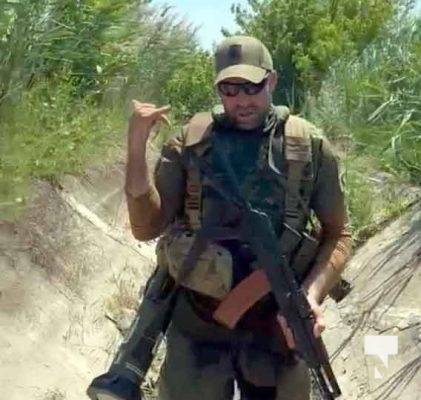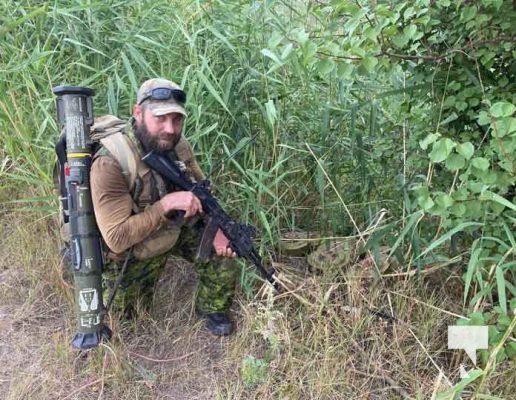Editors Note: Video, images and parts of the story maybe disturbing to some.
“It had to be done – I feel bad for leaving them,” James Challice
After spending over six months fighting Russians on the front lines a Northumberland County man has returned home.
Forty-two-year-old James Challice left for the Ukraine on March 29, 2022.
Challice told Today’s Northumberland at that time he was going to help the people of Ukraine in anyway he could.
He isn’t Ukrainian, didn’t know any Ukranian and didn’t speak Ukranian.
During his time in Ukraine he got to know the soldiers so well that he trained, he went on over 60 combat missions with them.
Starting out with 16 soldiers, but the end, there were only six in his group.
Challice has been on the front lines of the battle for most of his time in Ukraine.
Just a few days after arriving back home safely on September 12, 2022 he attended a Ukrainian supper fundraiser at St. George’s Anglican Church in Grafton.
Challice who hasn’t had a chance to really decompress sat he was very grateful and emotional or him to speak with the people from Ukraine.
“I just got back and I’m missing the people of Ukraine already.”
After a delicious meal, Challice sat down with Today’s Northumberland for an exclusive and candid interview about what is happening in Ukraine.
During the interview, Challice said the war in Ukraine is like no other was that’s ever been.
Technology is the main weapon with drones taking on a big role in the battle.
Challice started out training troops in Kyiv. Sometimes he only had a few days to train the men and then they were shipped off.
Challice spent time in the Canadian Forces until 2007, and joined as a reservist for five years with the Hastings and Prince Edward Regiment qualifying as an assault pioneer.
After training a number of soldiers, Challice helped train the instructors.
But when they were called Mykolaiv, Challice felt so strong of a bond that he went with them.
“We started to work right away. Came under a lot of heavy fire right at the very start.”
And Challice said he lost a very good friend in one of the first battles.
In some ways Challice looks back and it’s all a blur – in others, he remembers every second.
During that time Challice used everything from rifles to missiles. He recalls one time where he used a Javelin missile to hit a Russian tank that was over 600 metres away.
“I don’t know whether I’m happy or sad about that.”
There were two other tanks beside the one that Challice hit.
“They turned around and fired at us, but we were able to get out of that one.”
Coming under fire almost daily by small arms fire and missiles, over time, Challice got used to it. And it’s one of the things he’s trying to adjust to now that he’s home.
“I’ve had Russian soldiers run right up to me when we were there – we’ve had to do our job.”
“There was a lot more contact that I bargained for. It was more than I ever thought.”
In three months, Challice said his brigade lost 520 soldiers.
“We were lucky ones to make it out.”
Challice said the war in Ukraine is totally different from any other war that has happened.
“The way the war is fought these days is something Canada is going to have to take notice from. All the stuff we train for now is obsolete due to drones and artillery.”
Challice was part of a recce team which means getting information about enemy forces or positions by sending out small groups of soldiers or by using aircraft.
“We would go into 300 metres of the enemy with a Javelin (missile), RPG (rocket propelled grenade) and watch the enemy.”
They would then called in the position of the enemy for heavy shelling.
“Or we’d go into a village and set up a defensive. Usually try and wait for the Russians to come into us, which nine times out of ten it happened.”
When Challice was in the south of Ukraine, it was hard to move because of all the drones.
Challice said at times, Ukranian soldiers were in the trenches to draw enemy fire to be seen by the Russians.
That would give Challice and his team the chance to go around and get into position without the Russians spotting them, “either to engage the enemy or tell the artillery where they were.”
“The war is fought with artillery, drones and snipers.”
For the most part, Challice was a sniper.
“These drones are too hard to hide from and now they are carrying small munitions.”
Thermal tarps are used for the soldiers are the ground to blend in, but Challice said when you put a thermal tarp over you at night there are 30 or 40 drones flying over and you don’t know which one is yours or which one is theirs.”
“And they are all carrying munitions or they all have thermal capability to watch you. So it’s one of those things to fight a war like this. Nobody has fought a war like this.”
From ex-Navy Seals, British Special Forces, SAS that have been in Ukraine they’ve all said the same thing – “this isn’t anything like Afghanistan. It’s nothing like anything they’ve ever fought.”
With technology and weapons, “you don’t have to get close and personal anymore.”
“The only time your get close and personal is to go through a village.”
With short artillery having a range from two to 12 kilometres.
“So they can fire at you from 12-kilometres away. Once they notice you’re gone with the drones they can pull right up.”
With whose gaining what ground and who is winning Challice says there is both good and bad. But it’s not like what you see on the news.
“We haven’t moved at all in the south. We were able to hold them back. But when you hear the south is being pushed back (by Ukraine forces) no it’s not.”
“We haven’t been able to hold the line there.”
“When it comes to the east, we have made new gains due to the big weapons system. The big weapons systems are key and if they don’t get these throughout the winter I have a funny feeling that they are not going to do so hot when it comes to Nikolaev and Kharkiv.”
“But if they keep coming we should be able to push forward in the Spring.”
“Because when it comes to the wintertime there will be no movement anywhere.”
“The drones can detect you, they can see tracks in the snow, thermal – you’re not going anywhere. You’re going to sit in that trench and take fire.”
The last mission Challice was on was less than two weeks ago.
A four man tank team joined Challice and the other soldiers going through a field and small village.
They were told that the land mines had been all cleared.
“As we got there, first thing I saw was a butterfly mine on the ground. So I called it in, and they tell me to go anyways.”
“I told them we aren’t leaving until they get a guy to minesweep.”
When the area was cleared a day later, a total of 30 anti-personnel mines, 28 anti-tank mines and about 100 butterfly mines.
Challice and the soldiers eventually quietly entered the village, they discovered the Russians were approximately 300 metres outside the village.
“Soon as we got there, we started taking heavy fire from tanks directly into our side of the village.”
At that point Challice said there was nothing they could do. They were pinned down with constant shelling by the tanks.
Taking cover inside a small building, there was a small break in the shelling. Challice took out his phone and said, “guys they aren’t done yet,” and he started recording.
“All of a sudden a shell hit the room beside us.”
In the video you can hear the shell explode and blinding debris comes into where Challice and other soldiers are staying.
“At that point everyone is checking each other. I thought I was hurt – thought everyone else was hurt. Ringing in my ear – the concussion.”
Challice told the men to quickly leave the area which was against orders.
Tragically four soldiers were killed by the blast.
“My interpreter stopped and looked and he saw the house the other four guys were in and there was nothing left. He wanted to stop and dig them out. I said, they were dead. There was nothing left of that house.”
“At the same time he’s saying that, we’re getting shelled more and more.”
Shelling from tanks, infantry combat vehicles along with 50-calibre machine guns were constantly engaging Challice and the soldiers.
They eventually made it back, but Challice knew after that he needed a break.
“It was a little to close. I still can’t hear out of my one ear very well.”
Challice looks down and speaks of the 16 men he fought along beside and the 10 that died over those months.
“They were good guys. They did their job.”
“Unfortunately they got put into that position.”
“I just feel back because I didn’t think I,” then Challice corrects himself, “I think I did enough for them.”
For those that want to help, money is something that is not needed Challice says.
“They don’t need money. They don’t even want money. They want equipment for their soldiers. Small (metal) plates, newer helmets, weapons, small arms weapons.”
The United States, Poland and Germany have been sending their share, but when it comes to Canada, “I don’t really think we’ve stepped up to our end of the bargain.”
“Even if we don’t have much we can give something.”
Challice points out with winter coming, winter uniforms will be needed.
“I know for a fact there are 40 sniper rifles in Vancouver that is supposed to go to Ukraine, but the Canadian government is not going to purchase them to give to them. So we do have the stuff.”
As a Canadian, and former soldier with the Canadian Armed Forces, it makes Challice mad.
“Being down there and hearing all the stuff on the news what we’re supposedly doing and seeing it not being there is kind of discouraging.”
“It’s a hard one to swallow.”
Even soldiers to train them would be helpful.
“If we’re not doing anything right now, send 150, 200, 300, 1,000 officers down there to help them train their officers.”
They have the people, but they need them to be well trained Challice said.
When the war first broke out the soldiers were there to draw fire and advance.
“Now the second phase after six months getting shelled, losing half their brigades, half battalions at the very start. Now they are getting soldiers trained after there months.”
But Challice says that is a lot better than what he was given to train the soldiers when he first arrived.
Challice was given five days to three weeks before the Ukraine soldiers went into battle.
And with the way things are going and the training, it’s imperative to get the equipment. If that happens, Challice said, “I do think you’ll see the Ukraine’s do a lot better than they did at the very start.”
Asking point blank if Ukraine is winning or losing, Challice pauses, and says, “when it comes to bodies, we are definitely losing a lot more.”
“I can be honest about that. We’re losing usually 5-1. We’ve been sent on to many missions, I’ve dragged out to many bodies compared to what the Russians are losing.”
But the Russians are also using propaganda stating there are body counts of 80,000 Russians.
“Well that’s not true at all.”
“Most of the Russian casualties are conscripts, Syrians, Chechens, and even young kids they are sending up after three months of training.”
“They (Russians) are not using their professional soldiers yet. They are holding back for NATO. Same as their jets and their new equipment.”
People have said that Russia is going to run out of artillery, but Challice said they’ve been making it since the 1950’s and have been selling to other countries since then.
“They have two things in this war over Ukraine. They have time and artillery. And unfortunately Ukraine doesn’t have time, or enough artillery to defend or push forward.”
Challice tries to stay positive by saying Ukraine has made gains in the east, “but when it comes to the south, I can be dead honest with you, we haven’t moved an inch.”
“We’ve been losing bodies, left, right and centre – and so have the Russians.”
“It’s been a complete death gridlock.”
Talking to soldiers in Ukraine about the big question – why, Challice said that Putin wants to divide the world.
“You’ve got fighting Georgia, fighting in Turkey, fighting in Iran, fighting in Iraq, fighting in Africa. There is fighting all over the world being split in half because of whole war.”
“He wants his power back.”
Challice says Putin wants the Soviet Union back.
“It’s not about money, it’s not about religion, it’s about power.”
In the beginning when he arrived Challice said he was going to help out in any way he could.
“Then I started seeing bodies and inexperienced people going into a job without any support or any help.”
Going through what Challice did, certainly wasn’t for the money.
He didn’t sign a contract for nearly four months.
The contract he did eventually sign enables him to go with any brigade.
At this point, Challice is considered a temporary citizen who is part of the Ukranian military until the end of January.
Challice also admits, “there is corruption everywhere,” including in Ukraine.
“There is some instances where money is being lost, weapons are being lost at the border, and sold back to the Ukrainians. The corruption is real. The corruption is real in Afghanistan.”
“Some of these people are taking advantage of their own people.”
Challice gives examples of people selling medical equipment that was donated to Ukraine. Another example of a weapons store selling NATO issued firearms.
Challice confronted the store owner who said he was allow too. Shortly after the counter intelligence was infomed of what the store was doing. The next time Challice was in the store all the weapons had been removed.
When Challice first arrived, he found out that soldiers in the military are issued a weapon and uniform – that’s it. They have to purchase their own boots, helmets and other items. Or you try to find it anyway you can.
Travelling from the front lines to the cities which can be only 20 kilometres away it’s a totally different feeling.
“The stores are still open. Coffee shops, restaurants, shopping markets. They are keeping their economy open. It’s surreal.”
“Sometimes at night you’d have 40 missiles hit Mykolaiv. They’re big missiles that will take down an apartment building. The sound goes through your chest. You wake up in the morning, coffee shops are open. You’re talking to people in the super market. They don’t shut down.”
“The pride of the people is absolutely phenomenal.”
Shortly after arriving and meeting the people, Challice said he knew what he did was the right thing.
“They are so accepting. The fact that they are willing to fight for something that a bigger than them. The way they treat other people from different countries. It’s just like family.
In Canada it seems that people worry about such small problems.
“I love the Canadian military, I love Canada,” but Challice said there is to much politics in the Canadian military.
“Our military isn’t like it used to be.”
“We need a change. People all around the world love our military,” but he candidly says if the Canadian military was in the war in Ukraine, “we’d have to start from scratch.”
Basic soldiers skills are fine, but when it comes to specialty skills is where the Canadian military would fail.
“You can’t just be out the open and dig a trench. You have to hide from these drones. There are so many different aspects to this war than any other war. So when it comes to rehearsing or work-up training to missions to fight in the Ukraine, you couldn’t do the stuff that we do because a lot of the stuff is obsolete.”
The artillery is fine, but it’s the infantry simply wouldn’t be prepared.
“We’re good at what we do, say in World War II, in Georgia, in Afghanistan, but here is totally different.”
“This is a drone war. They are like flies. They carry munitions and everybody is a drone operator.”
Sitting outside the church in Grafton, Challice said he has no regrets about going over.
“It had to be done.”
“Between all the people I met, I feel bad for leaving them. I do want to go back. I feel like I have some unfinished business there.”
In the broader picture, Challice said the entire world will feel this war in some way.
“I don’t know how to take it, but I know I was down there and I did a good thing. I can feel proud of myself about that.”


